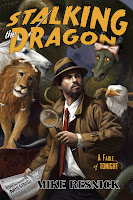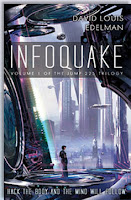Want another reason to feel good about the future?
Here’s a peak at our Spring/Summer 2009 Season:
March:
 Tom Lloyd, The Twilight Herald
Tom Lloyd, The Twilight Herald (Book Two of the Twilight Reign)
(Book Two of the Twilight Reign)
Less than a year after being plucked from obscurity and poverty the charismatic new Lord of the Farlan finds himself unprepared to deal with the attempt on his life that now spells war, and the possibility of rebellion waiting for him at home.
Matthew Sturges, Midwinter
Mauritaine once heroic Captain in the Seelie Army, now accused of treason and sentenced to life without parole, is offered one last chance to redeem himself, an opportunity to regain his freedom and his honor in the secrete service of Queen Titania.
April:
Ian McDonald, Brasyl (coming in trade paperback!)
(coming in trade paperback!)
Be seduced, amazed, and shocked by one of the world’s greatest and strangest nations. Past, present, and future Brazil, with all its color, passion, and shifting realities, come together in a novel that is part SF, part history, part mystery, and entirely enthralling.
James Enge, Blood of Ambrose
Behind the King’s life stands the menacing Protector, and beyond him lies the Protector’s Shadow… Against this evil, Morlock Ambrosius–stateless person, master of all magical makers, deadly swordsman, and hopeless drunk.
 May:
May:
Joel Shepherd, Crossover (coming in mass market!)
(coming in mass market!)
The first novel in a series that follows the adventures of Cassandra Kresnov, an android created by the League, one side of an interstellar war against the more powerful, conservative Federation. The product of an experimental design and dangerously intelligent, Cassandra raises probing questions and experiences moral awakening. Soon she has deserted the League in search of a new life in the territory of the Federation.
Sean Williams, The Hanging Mountains (Books of the Cataclsym: Three) (coming in trade paperback!)
(Books of the Cataclsym: Three) (coming in trade paperback!)
In this third installment of Williams’s Books of the Cataclysm, Sal and his companions seek the source of the flood in the legendary Hanging Mountains, hoping to head off a crisis that was put in motion a thousand years ago. They uncover uncomfortable truths about the world and how it relates to the one that came before — our world.
Mark Chadbourn, World’s End (Age of Misrule 1)
(Age of Misrule 1)
A dragon firebombs a freeway. Shapeshifters stalk the commercial district. The deadly Wild Hunt wreaks havoc on the highway. The Age of Misrule has dawned. In times of trouble, heroes arise!
June:
Joel Shepherd, Breakaway (coming in mass market!)
(coming in mass market!)
Cassandra Kresnov is a highly advanced hunter-killer android. She has escaped the League and fled to Callay, a member of the Federation. Breakaway is a great story with a cracking plot and strong characters. At its heart is the enigma of Cassandra: Is she more human than human, or is she totally untrustworthy?
Mark Chadbourn, Darkest Hour (Age of Misrule 2)
(Age of Misrule 2)
The Eternal Conflict between the Light and Dark once again blackens the skies and blights the land. And in the middle are the Brothers and Sisters of Dragons, determined to use the strange power that binds them to the land in a last, desperate attempt to save the human race.
July:
 Joel Shepherd, Killswitch
Joel Shepherd, Killswitch (coming in mass market!)
(coming in mass market!)
Two years after the unhatching of Callayan President Neiland’s plot to make the capital city of Tanusha the center of the Federation, Callay is under siege. So begins the third installment of this gripping trilogy from an exciting new sci-fi author. When Cassandra’s lover, Special Agent Ari Ruben, discovers a plot to kill her using a killswitch, which her old masters in the League built into her brainstem, Sandy is forced to go underground to stay alive.
 Ian McDonald, Desolation Road
Ian McDonald, Desolation Road
It all began 30 years ago on Mars, with a greenperson. But by the time it all finished, the town of Desolation Road had experienced every conceivable abnormality…
Mark Chadbourn, Always Forever (Age of Misrule 3)
(Age of Misrule 3)
Mankind’s days appear numbered. Our only hope – the Brothers and Sisters of Dragons – are scattered and broken after a terrible defeat. Their last chance may lie in the great court of the old gods, reached by an otherworldly ship filled with fantastical and frightening creatures.
August:
 Mike Resnick, Stalking the Dragon
Mike Resnick, Stalking the Dragon (A Fable of Tonight)
(A Fable of Tonight)
It’s Valentine’s Day and private detective John Justin Mallory must undertake a nocturnal hunt for the miniature dragon that takes him to some of the stranger sections of his magical Manhattan.
Justina Robson’s Chasing the Dragon (Quantum Gravity Book Four)
(Quantum Gravity Book Four)
Returning to the life of a guns-blazing secret agent, cyborg Lila Black finds herself having inherited all of her former boss’s old offices and whatever mysteries they contain… But there are more immediate concerns. Like resurrecting her lover, Zal. And her husband, the demon Teazle, is embroiled in a fatal plot in Demonia, and her magic sword is making itself happy as a pen whose writing has the power to affect other worlds. The world is off its rocker and most everyone is terrified of faeries.
I’ll say more about these individual titles as we get closer to 2009, debuting more cover art as it comes in, and profiling some of the new authors and introducing them to you. Meanwhile, you can download a PDF of the whole Spring/Summer 2009 catalog here. But for now, what do you think?







